General Charles de Gaulle
Sharl De Goll
General Charles de Gaulle, who saved France, united the French people, liberated Algeria and other colonies of the empire, still remains one of the most mysterious and contradictory figures in the new history of Europe. His methods were repeatedly used by many politicians, and his attitude to duty, to life, to himself, aspirations and convictions became an example for entire generations.
Charles Andre Joseph Marie de Gaulle was born on 22 on November 1890 of the year in the town of Lille, in the house of his grandmother, although his family lived in Paris. His father's name was Henri de Gaulle, and all his life he worked as a teacher of philosophy and history. De Gaulle was rightly proud of his deep roots, many of their ancestors were famous teachers and philosophers. And one of the family members participated in the uprising of Joan of Arc. Following the wishes of his parents, de Gaulle received an excellent education. Young Charles read a lot, tried to write poetry, was fond of history, especially since his father constantly told him about the glorious past times. Even at a young age, de Gaulle showed remarkable persistence and talent in managing people. He systematically trained his memory, which will allow him to later amaze others, memorizing by heart thirty-forty pages. Amused de Gaulle also specifically. For example, I learned to pronounce the words backwards. To do this for the French spelling is much more difficult than for the English or Russian, but Charles could easily speak so long phrases. At school, he was interested in only four subjects: philosophy, literature, history and military affairs. It was precisely the desire for military art that caused Charles to go to Saint-Cyr, where the Military Academy was located.
There is an opinion that military service takes away a person's ability to think independently, makes him mindlessly carry out orders, turns him into a dull martinet. One can hardly find a more visual refutation of this nonsense than the life of Charles de Gaulle. Every day he wasn’t wasted for him. He did not cease to read, closely followed the device of the French army and noted its shortcomings. In his studies, de Gaulle was diligent and responsible, but he was arrogant among his fellow students. For character and high growth comrades nicknamed him "long asparagus." In 1913, Lieutenant Charles de Gaulle was sent to serve in the infantry regiment. As soon as the war began, he was wounded twice, was captured by German prisoners, in which he made five unsuccessful escape attempts and was released only three years after the armistice was concluded. After that, de Gaulle took part in the intervention in Russia as an instructor of the Polish troops, then served in the troops occupying the Rhine, and was among the military personnel who invaded the Ruhr. He warned the authorities about the stupidity of this operation, which eventually ended in a deafening fiasco, which led to a decrease in the share of France in reparation payments. At the same time, Charles wrote a number of books, among which was “Discord in the camp of the enemy,” begun in captivity and which was a sharp criticism of the actions of the German government and army during the First World War. It should be noted here that in France at that time the organization of the German military machine was considered ideal. Charles clearly indicated significant miscalculations of the Germans. In general, de Gaulle's views on tactics and strategy, on the structure of the army as a whole, were very different from the convictions of the bulk of the French headquarters.
In 1925, Marshal Petain, the Verdendian winner and indisputable authority among the French military, drew attention to the young de Gaulle, appointing him as his adjutant. And soon the future general was instructed to report on a complex of defensive measures taken in case of a future war. De Gaulle, of course, prepared this work, but for Petain it came as a complete surprise, since it fundamentally contradicted the views existing in the headquarters. Based on the strategic and tactical lessons of the “positional” World War I, the marshal and his supporters focused on the fortified defense line, the infamous “Maginot Line”. However, de Gaulle argued about the need to form mobile tactical units, proving the futility of defensive structures in the modern development of technology and taking into account the fact that the French borders are mainly on open plains. As a result of the outbreak of conflict, his relationship with Peten was ruined. However, the very first days of the Second World War confirmed the correctness of Charles de Gaulle.
Being in disgrace, de Gaulle managed to successfully implement his undertakings. He was also almost the only career military, allowing himself to open conversations in print. Of course, this was not welcomed by the authorities, but it noticeably added to his popularity in the country. Historians know that when confronted with difficulties, de Gaulle often turned to politicians, repeatedly compromising his principles in order to achieve a goal. He was seen among the representatives of the ultra-right forces, and, despite all his education and habits, among the socialists. Already on this period of time it was possible to detect two main traits of de Gaulle's character - the tendency through small tactical defeats to win in the main and the craving for innovation. Also the most important component of the method of Charles was the breadth of its strategic design. For this man there was only one scale - the scale of his country.
Not all de Gaulle's innovations were in vain, but the effect of them as a whole was negligible. The reorganization did not practically affect the state of the army. And de Gaulle, who had been promoted to colonel by that time, as if in mockery was appointed to command the only tank regiment, the creation of which he so defended. There was a shortage in the unit, and the existing tanks were very outdated. Nevertheless, after Germany attacked Poland on September 1, 1939, and Great Britain and France declared war on it, de Gaulle, at the cost of incredible efforts, managed to stop the fascists' advance from the north and even toss parts of it back. Charles was immediately promoted to brigadier generals, a title that he preferred to keep for the rest of his life. Despite the successes of his hastily organized fourth tank division, this had no significant effect on the general course of hostilities, and in a matter of days most of the French land was occupied.
In June 1940, Paul Reynaud determined de Gaulle to a high place in the Ministry of Defense. Charles concentrated all his strength on continuing the struggle, but it was too late. The Raynaud government resigned, and Marshal Petain signed a document on the surrender of France. De Gaulle got to London, where in a matter of days he created the organization Free France and demanded that the British authorities provide him with a radio broadcast broadcasting on the lands seized by the Nazis, as well as on the territory of the Vichy regime. For many years, for thousands of his compatriots, participants of the Resistance movement, his voice, the voice of freedom, which sounded for the first time on 18 on June 1940 and delivered five-minute speeches twice a day, remained the only hope for a future victory. He began his first message in the manner of the French kings: "We, General de Gaulle, are turning to France."
The envoys of Free France visited all the free French colonies and countries of the modern “third world”, seeking the recognition of Charles de Gaulle as the leader of the “free French”. The closest contact was also established with the Resistance; the general supplied him with all the small means that he had. In relation to the leaders of the allies, de Gaulle from the very beginning set himself up as an equal. By his obstinacy, he constantly derailed Churchill and Roosevelt. Having habituated the general, the British prime minister first of all hoped to manipulate internal resistance and free colonies, but he was cruelly mistaken. When their eyes converged, everything went well, but as soon as differences arose, a fierce argument ensued. It is known that de Gaulle often reproached Churchill for his irrepressible passion for alcohol, and the Prime Minister in response shouted to him that the general imagines himself to be a new Jeanne d'Arc. Once their conflict nearly ended with the de-Gaulle deportation. In his letters to Roosevelt, Churchill called the arrogant Frenchman "a stupid person who imagines himself the liberator of France," complaining that "the unbearable impudence and rudeness in his behavior are complemented by active Anglophobia." Roosevelt also did not remain in debt, calling de Gaulle "a naughty bride" and offering Churchill to send Charles "the governor to Madagascar." However, the ingenious combinations of Roosevelt, who reinstated Churchill against the general, stumbled upon the firm position of the English Cabinet, declaring to its prime minister: protectorate".
Despite all the difficulties, Charles de Gaulle, virtually from scratch, created a centralized organization with amazing speed, completely independent of the Allied forces and in general from anyone, possessing its information headquarters and armed forces. Each of the people practically unknown to him earlier, whom the general gathered around him, signed the Act of Accession, denoting not only entry into “Free (Later Fighting) France”, but also unconditional submission to de Gaulle. From 1940-th to 1942-th year, the number of some soldiers who fought under the flags of the “Free France” increased from seven to seventy thousand. As a result of the military and political struggle to the beginning of D-Day, 7 of June 1944 of the year, Charles ensured that the National Liberation Committee subordinate to him was recognized by all the Allied countries as the provisional government of France. Further more. Thanks to the efforts of only one person, France, in fact, entered into an alliance with the Nazis, won the right as a country to win its own occupation zone in Germany, and a little later and a place in the UN Security Council. Such successes can be called fantastic without exaggeration, especially considering that at the very beginning of the struggle de Gaulle was in fact a deserter warmed by England, whom the military tribunal of the French army had sentenced to death for treason.
De Gaulle adored playing on the feud of his allies. Both the seat on the Security Council and the occupation zone were gained by France only because the general was supported by Stalin. De Gaulle managed to convince him that France would help in establishing the balance of power in the United Nations, which was inclined towards the Soviets. After the end of the war, the temporary government of de Gaulle came to power in France. His main slogan in domestic policy was: "Order, law and justice", and in the external: "Greatness of France." The main tasks of Charles was not only the resurrection of the country's economy, but also its political restructuring. Today we can firmly say that the general successfully coped with the first one — the largest enterprises were nationalized, social reforms were carried out with the simultaneous purposeful development of the most important industries. Much worse came with the second. Following his convictions, de Gaulle did not openly support any of the existing parties, including the “Gaullists” - active supporters of the general. When the interim parliament proposed a constitution for the Fourth Republic with a unicameral parliament that appointed the government and a president with limited powers, De Gaulle, who waited until the last moment, revealed to the world his own version, distinguished by the functions of the president, endowed with strong executive power. Despite the high prestige among the people, the position previously occupied by them over the political struggle (“above-class arbitration” in his own words) played a cruel joke with Charles. In the battle for the new constitution, he was defeated, the option proposed by parliament was adopted at the referendum, and in the elections to the National Assembly, representatives of the “Gaullists” received only three percent of the vote. In January, 1946, Charles de Gaulle resigned on his own accord.
His vacation in the political life of the country lasted for twelve years. During this time, the general led social activities and just enjoyed life with his wife in a family house located in the town of Colombe-les-De-Eglise two hundred and fifty kilometers from Paris. Charles talked with journalists from different countries, wrote memoirs, traveled a lot. He liked to play solitaire (“solitaire” in French means patience). The country at this time was breaking crises. In 1954, France suffered a crushing defeat from the national liberation movements in Indochina. There were riots in Algeria and several other countries in North Africa, which are French colonies. The franc currency rate fell, the population suffered from inflation. There were strikes around the country, governments replaced each other. De Gaulle preferred to remain silent, without commenting on the situation in any way. In 1957, the situation deteriorated further: the right and left-wing extremist movements intensified in society, the government was in an acute crisis, and the military leading the war with the rebels in Algeria were threatened with a coup.
After the 13 of May 1958, a similar coup almost happened, on May 16, the French President, with the approval of the parliament, asked de Gaulle to take the office of prime minister. And in December, 1958 de Gaulle was elected president with an unusually wide range of powers for France. The general could declare an emergency and dissolve parliament, call new elections, personally supervise all matters relating to foreign policy, defense and the most important internal ministries.
Despite the seeming ease and speed with which the general was at the helm of power for the second time, historians unearthed evidence of the hard work of Charles himself and his followers. In recent years, he has been constantly negotiating with parliamentarians and leaders of ultra-right parties through intermediaries. At this time, de Gaulle relied on the psychology of admiring the crowd before the mystery, secretiveness, brevity and emotional charm of the leader. “I am a man who does not belong to anyone and belongs to everyone,” de Gaulle said on the steps of parliament, while rallies of the Gollists were held in Paris calling on the government to resign. De Gaulle’s new constitution was approved by nearly eighty percent of the votes and introduced presidential form of government for the first time in French history, restricting parliament to legislative rights. The authority of Charles took off to the skies, and the pushed "parliament" could not prevent him from communicating directly with the people with the help of independently appointed referendums.
Trying to solve problems of an economic, foreign and domestic political nature, his goal was still the same - to turn France into a great power. De Gaulle held a denomination, releasing a new franc worth a hundred old. According to the results of 1960, the economy showed the fastest growth indicators for all the post-war years. Realizing the futility of a military solution to the Algerian issue, de Gaulle had been preparing the country for four years for the inevitability of independence for Algeria and was looking for a compromise that would allow France to maintain access to oil sources and other natural resources in the Sahara. The Algerian operation ended in March 1962 with the recognition of the country's rights to self-determination and the signing in Evian of ceasefire, transfer of sovereignty and further relations between states.
In foreign policy, Charles fought for Europe to gain independence and independence from the United States and the Soviet Union. Offended even during the war years, Churchill's arguments about the status of France, he refused to recognize the British as full Europeans. When the Common Market was created in Europe, the general managed to block the entry of Great Britain into it. In deciding on the election of the president of France by direct and universal suffrage, de Gaulle had to dissolve parliament. December 19 The 1965 of the year was re-elected for a new seven-year term, and soon he announced that the country was turning to real gold in international payments. He said: “... I consider it necessary to establish international exchange on an indisputable basis, not bearing the seal of any particular country .... It’s hard to imagine any standard other than gold. Gold never changes nature: it can be in bars, bars, coins; has no nationality; It has long been accepted by the whole world as a permanent value. ” Soon, according to the Bretton Woods Agreement, Charles demanded that the United States exchange a half billion dollars for live gold at thirty-five dollars per ounce. In case of refusal, de Gaulle threatened to withdraw the country from NATO, eliminating all (about two hundred) NATO bases on its territory and removing thirty-five thousand NATO soldiers from France. Even in economics, the general worked by military methods. The USA has capitulated. Nevertheless, France nevertheless withdrew from NATO, after Eisenhower rejected De Gaulle’s proposal to organize a tripartite directorate in the military-political bloc, which would include the United States, Britain and France. After the separation of France from the North Atlantic Alliance was completed by the autumn of 1967, de Gaulle proposed the concept of “national defense in all azimuths”, which allows repelling the attack from any side. Shortly thereafter, France successfully conducted a hydrogen bomb test in the Pacific.
However, in calm years, all the capabilities and talents of de Gaulle were not revealed in all their glory, the general always needed a crisis in order to reveal to the world what he was really capable of. “Dirigisme” Charles in the life of the country eventually led to the crisis of 1967, and the aggressive foreign policy that he publicly condemned the dangerous militaristic actions of the NATO countries, fiercely criticized the Washington administration (especially for the Vietnamese conflict) , sympathized with the Quebec separatists and Arabs in the Middle East, undermined the status of de Gaulle in the domestic political arena. In May, the 1968 of the Paris streets were blocked by barricades, the population was on strike, there were posters everywhere on the walls “It's time to leave, Charles!”. For the first time, de Gaulle was confused. After the parliament rejected the general legislative proposals of the general, it is ahead of schedule, on April 28 of 1969 of the year, for the second time left his post. “The French seem to be tired of me,” Charles joked sadly.
After retiring, Charles de Gaulle returned to his modest home in Colombe de les Eglise. He did not ask for any pension, protection or benefits for himself. He died de Gaulle home 9 November 1970 year. According to the will, he was buried in a small local cemetery without public ceremonies. However, over eight hundred thousand people took part in mourning events on the day of the funeral in Paris. Representatives of eighty-five countries of the world flew in to express their condolences.
In fact, about the merits of de Gaulle, exactly, as about his blunders, we can talk endlessly. Being a gifted theorist of military affairs, he did not participate in any historically important battle, but he was able to lead France to victory where it seemed to be inevitable defeat. Not familiar with the economy, he twice successfully led the country and twice brought it out of the crisis, primarily due to its ability to organize the work of the structures entrusted to it, whether it is a rebel committee or the government of an entire state. For his compatriots, Charles de Gaulle is the greatest hero along with Joan of Arc. He managed to write more than a dozen books, both memoirs and theoretical works on military affairs, some of which are still considered bestsellers. This man, who voluntarily resigned twice, was respected and feared by the allies, believing that he was a new dictator of the Hitler type. General Charles de Gaulle left to descendants one of the most stable European political systems, called the Fifth Republic, according to the constitution of which the country lives today.
Information sources:
http://x-files.org.ua/articles.php?article_id=2765
http://www.hrono.ru/biograf/bio_g/goll_sharl.php
http://www.peoples.ru/state/king/france/gaulle/
http://www.c-cafe.ru/days/bio/29/gaulle.php
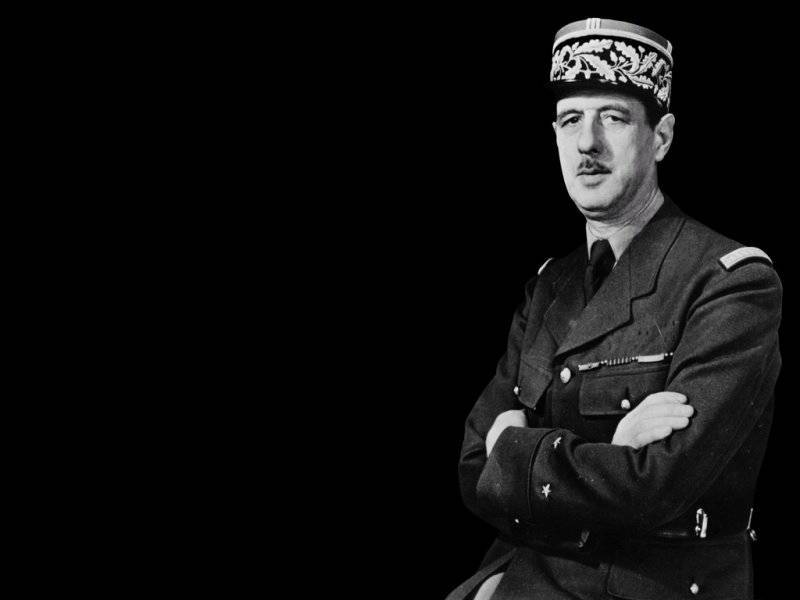
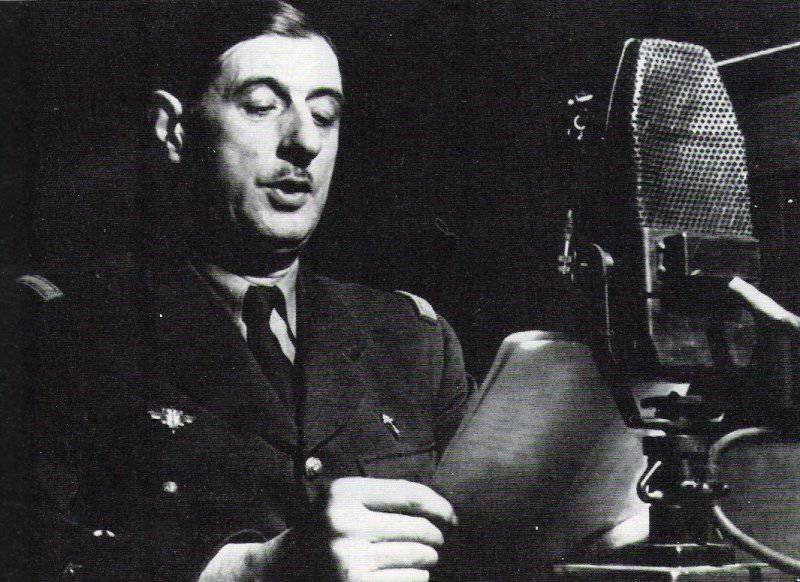
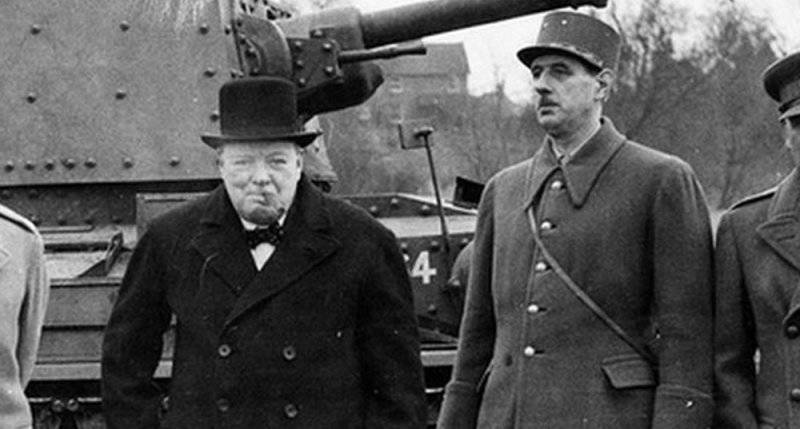
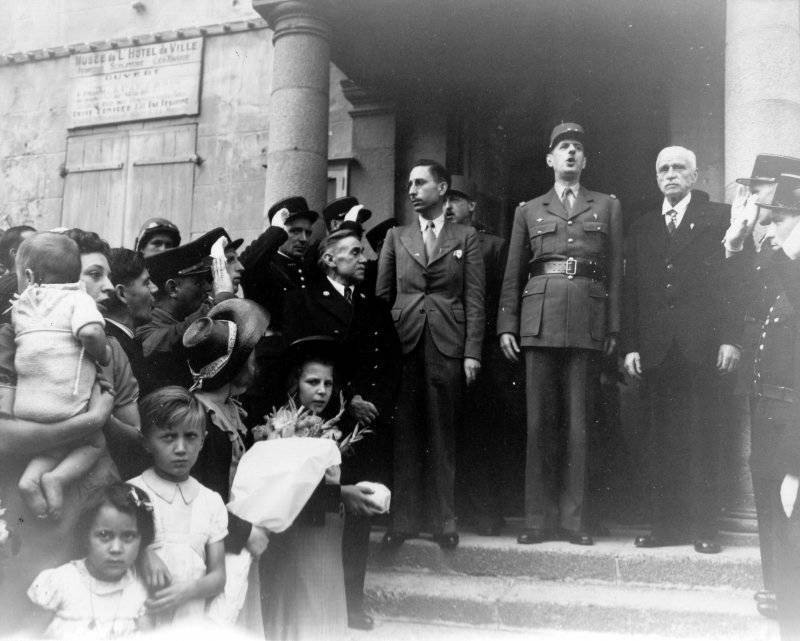
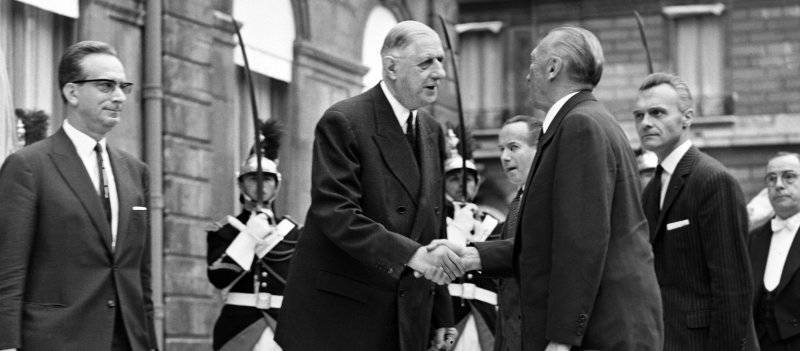
Information